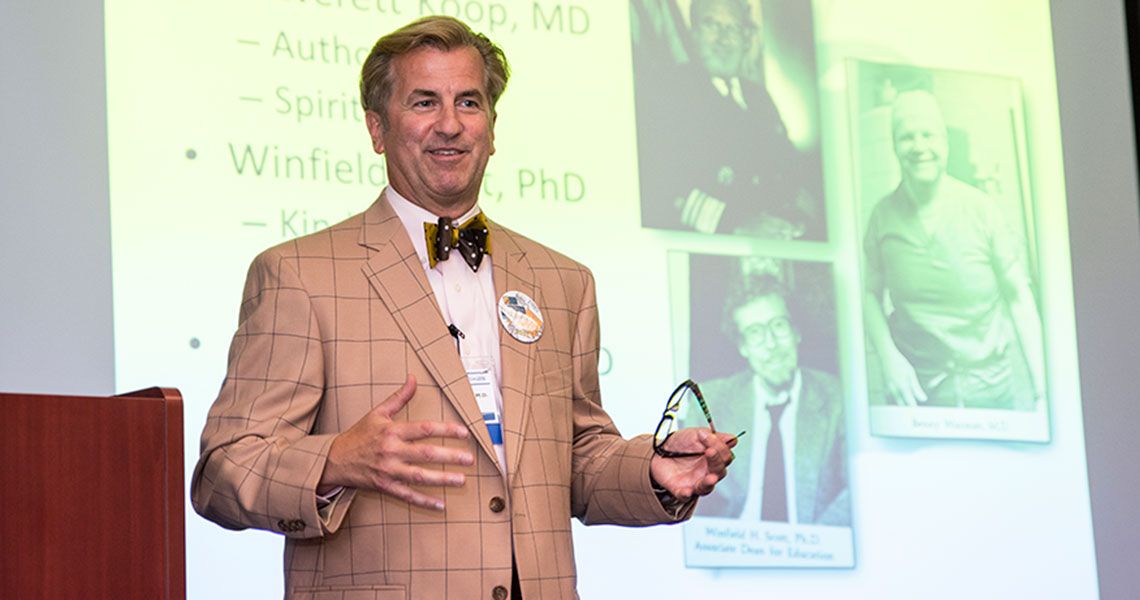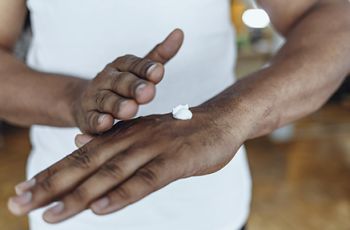Humor, caring, and pop culture references peppered the Allan B. Weingold Obstetrics and Gynecology Lecture during Alumni Reunion Weekend at the GW School of Medicine and Health Sciences (SMHS).
“We’re really grateful to Dr. Woodland for agreeing to speak today,” said Nancy Gaba, M.D. ’93, RESD ’97, FACOG, the Oscar I. and Mildred S. Dodek and Joan B. and Oscar I. Dodek, Jr. Professor and Chairman of the Department of Obstetrics and Gynecology at SMHS. “I could go on and on and on with our introductions for Dr. Woodland. His CV has pages of invited lectures and pages of honors and accolades about him as a teacher, as a physician, and as a mentor. I’m not going to do that because I think he’s going to.”
“I can always talk about myself,” Woodland interjected, to laughter from the crowd.
Woodland, M.D. ’85, RESD ’87, chair of the Department of Obstetrics and Gynecology at Reading Health System and a specialist in comprehensive obstetrics and gynecology, focused his presentation on physician wellness and mentorship.
“Mentorship,” Woodland explained, “is following the person in front of you.”
The role of mentors is vital, he told the audience of alumni and medical students, as statistics flashed on the screen in Ross 117. Residents in OB/GYN, according to Woodland, tend to feel less mentored than students or fellows, and women feel less mentored than men. Remedying that is crucial to an evolving educational landscape. “The clinical learning environment is changing tremendously,” he said. “If you think about it, promoting the importance of mentorship throughout our professional lives should be our mission.”
Woodland’s own experience with mentors shaped his medical career. Using Forrest Gump, Woodland illustrated the parallels between Forrest’s journey and his own: medical school is a “confusing time” like Forrest’s college years, and residency isn’t so different from boot camp.
“Like Forrest Gump, my life has taken a path around that has [enabled me to meet] many people; in fact, it started with Dr. Weingold, because Dr. Weingold was the chair of our department when I was here,” Woodland said. “He saw something in me — maybe it was that I could run fast.”
Professor Emeritus Allan B. Weingold, M.D., HON ’98, former vice president for health affairs at GW and former chair of the Department of Obstetrics and Gynecology at SMHS, nodded and waved from the audience, where he sat with his wife, Marjorie, near Clinical Professor Emeritus Oscar Dodek and his wife, Mildred. The Weingolds’ continued support and generosity to the SMHS Obstetrics and Gynecology Department made the day’s lecture possible.
In addition to Weingold and medical mentors C. Everett Koop, M.D., HON ’91, and SMHS professors Winfield Scott, Ph.D., and Benny Waxman, M.D., Woodland drew from his original learning environment: his family. As one of six — four girls and two boys — Woodland’s family meals were often chaotic. During dinner, however, each child took turns to say one “clapper” and one “booer” for the day, something good and something bad. It’s a technique that Woodland has carried into his professional life.
“Mentorship is really about parenting,” he said. “It’s really about stressing successes and failures. Stressing the clappers and booers, because that’s what’s important, to say ‘this went well, this didn’t go well.’ The big elephant in the room, though, is we’re not doing it very well right now in medical education.”
Physicians, Woodland said, are becoming more susceptible to depression and other mental illnesses, especially during the transition between medical school and residency. Binge drinking and drug use are common, and more than 400 physicians commit suicide each year. “Mentorship and well-being matter,” he added. “They matter in a big way.”
Health care professionals, he said, need to make wellness a priority, and mentors need to establish relationships with potential protégées when they’re at their most vulnerable, if not earlier. “We know that we need to role model, we know that we need to nurture, we know that we need to support, and we also need to provide some resources,” he said.
To that end, Woodland, with the American Congress of Obstetricians and Gynecologists, created a video identifying steps to resilience and fulfillment for health care providers in obstetrics and gynecology. Among that advice is taking control, cherishing loved ones, and embracing the privilege of taking care of women. Woodland is also reaching out to provide support with his fellow Class of 1985 alumni.
“As we celebrate our 30th reunion, we as a class decided to do something special for GW. Our class gift is actually to give back to support wellness,” he said. The gift, The Alumni Legacy Fund for Physician Wellness, will provide for wellness and self-care programs for the GW medical community.
As he concluded his presentation, adding that diversity is critical in clinical learning environments — not unlike different sizes and colors of crayons living in the same box — Woodland flashed again to Forrest Gump.
“And that’s all I have to say about that.”



